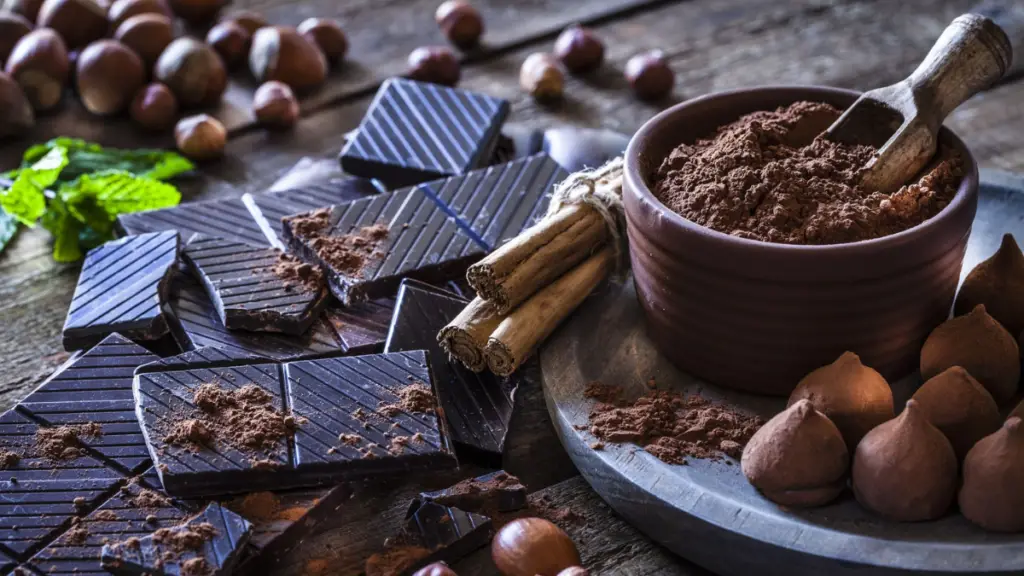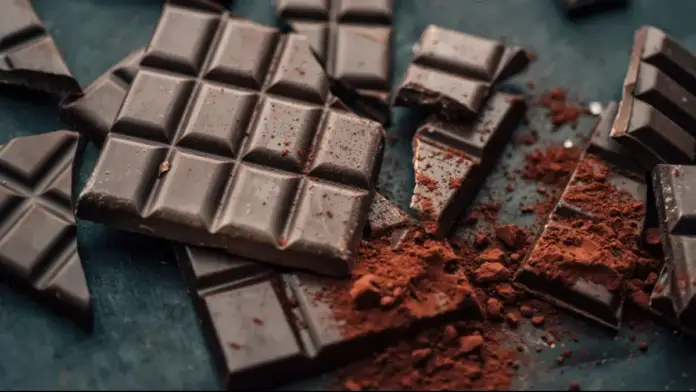Is Dark Chocolate Good For You – Any chocolate that has at least 50% sugar, cocoa butter, and cocoa solids is considered dark chocolate. Dark chocolate isn’t created using milk, however, there’s a chance that some were accidentally mixed in during production.
Is Dark Chocolate Good For You
A lower-quality dark chocolate may also contain artificial flavours, oils, and butter fats. Humans have consumed chocolate since the Mayans, who did so approximately 1500 B.C. Even with all of these reasons, chocolate remains a popular delicacy, especially dark chocolate.
Is there caffeine in dark chocolate?
In actuality, the more cocoa solids, the more caffeine. The caffeine content in a 3.5-ounce portion of 70%–85% cacao dark chocolate is 80 mg. By contrast, a 12-ounce can of caffeinated soda has between 40 and 55 milligrammes, while an 8-ounce cup of brewed coffee has roughly 95 milligrammes. Watch the amount of caffeine in your dark chocolate if you’re trying to cut back on your intake.
Sunil Narine: Net Worth, Age, Bio, Best Achievements, and Family Overview
Is vegan chocolate dark chocolate?
Examine the label. Since cocoa is natural, it is vegan. However, during processing, certain dark chocolate products absorb trace amounts of dairy. Dairy products also include other additional ingredients such as whey, lactose, and casein.
Is chocolate that is dark healthy?
Some ingredients in dark chocolate are good for your health. However, it has a good amount of added sugar, fat, and calories. It’s ideal if you eat it in moderation, as with many things. It is a better option because it has less sugar than milk chocolate.
Health Benefits of Dark Chocolate
Flavanols, which are compounds found in plants like the cacao tree (where the cocoa bean grows), are abundant in the cocoa used to make dark chocolate. The distinct flavour of pure cocoa comes from the flavan-3-ols found only in cacao beans. The antioxidant and anti-inflammatory qualities of cocoa’s flavanols may aid in:
Keep your heart safe.
Dark chocolate may protect against heart and blood vessel (cardiovascular) illness, according to different research. In addition to its potential anti-inflammatory benefits, dark chocolate also lowers blood pressure and may help prevent blood clots. To confirm whether these impacts are interrelated, more research is required.
Lower your chance of developing diabetes
Cocoa flavanols are believed to improve insulin sensitivity, which may eventually lower the chance of developing diabetes.
Reduced arterial pressure
A review study discovered that, even at tiny doses, eating dark chocolate helped lower blood pressure. According to another study, it enhances blood vessel elasticity and function and may even prevent arteriosclerosis, a condition in which plaque and fat deposits cause your arteries to stiffen.
Boost your vision
According to a tiny study, those who consumed dark chocolate two hours later had better vision than those who consumed milk chocolate. It’s unclear whether this would be effective in real life or how long this effect might endure. A comparable small study found that eating dark chocolate did not have the same benefits on vision. Much more investigation is required into this potential advantage.
Could enhance mental performance
Regular use of moderate amounts of high-cocoa dark chocolate may enhance blood flow, including to the brain, due to its favourable effects on the vascular system. Additionally, research indicates that flavanols have some neuroprotective properties, which may be helpful in preserving cognitive function in the elderly.
Nutrition of Dark Chocolate
Chocolate that is at least 70% dark will provide you with the highest amount of flavanols. Minerals and a tiny amount of fibre can be found in dark chocolate, including: Zinc, Iron, Magnesium, Phosphorus, Copper
Is chocolate that is dark healthy?
Dark chocolate is superior to other varieties of chocolate. According to Peart, dark chocolate contains less added sugar and fat than milk or white chocolate, but it also has a lot of flavonoids, which are healthy antioxidants.
Fundamentally, cocoa butter, sugar, and cocoa solids are the same elements found in both milk and dark chocolate. However, the amount of cocoa solids in the two types of chocolate varies.
According to Peart, dark chocolate contains 50% to 90% cocoa solids. “And milk chocolate contains anywhere from 10% to 50%.” It should come as no surprise that the amount of cocoa solids in dark chocolate influences how much it helps you.
According to Peart, “the higher percentage of cocoa solids, the more flavonoids and the lower sugar.” When attempting 75%
Reasons Why Chocolate Is Not a Guilty Pleasure
According to a 2014 study, women who connected eating chocolate cake with celebration were better at maintaining their weight, whereas those who related it with guilt were more likely to have a variety of issues, such as reduced effectiveness in both short- and long-term weight management sensations of powerlessness and uncontrol unhealthy eating habits
More discontent with one’s body image and lower standard of living Stopping the stigma associated with chocolate cravings is essential to counteract their detrimental effects. It’s okay to experience cravings for some foods, like broccoli or chocolate.
According to the experts, labelling any meal as totally forbidden frequently increases appetites for that food and causes guilt when you do consume it.
Try establishing some ground rules for your relationship with chocolate instead.
Enjoy and savour it guilt-free, with intention and purpose. Avoid fidgeting with an endless bowl of chocolate candy while watching TV. Rather, pay attention to the occasion and purpose of your meal.
For example, suppose you have plans to spend the weekend at a restaurant that serves a famous chocolate dessert and you usually have a square of dark chocolate every day. In that case, you might choose to forgo your daily indulgence in favour of the weekend pleasure.
Instead of alternating between trying to fully avoid chocolate and then overindulging, a healthy relationship with it allows you to enjoy it in moderation and guilt-free.
Is it okay for anyone to eat dark chocolate?
For most of us, at least, moderate consumption of high-cocoa, minimally processed dark chocolate is generally accepted as safe and may be incorporated into a varied, well-balanced diet.
Cacao and the majority of dairy-free dark chocolate products are plant-based and therefore appropriate for vegan diets. Caffeine and theobromine are two stimulants found in dark chocolate, so you might want to limit your consumption if you are sensitive to these substances.
Some people may develop an allergy to chocolate or one of its other constituents, even though a real allergy to cacao or cocoa is uncommon. For instance, one of the 14 common allergens mandated by UK legislation is soy lecithin, a common stabiliser used in confections.
Is eating dark chocolate acceptable for everyone?
For the majority of us, at least, moderate intake of minimally processed, high-cocoa dark chocolate is regarded as safe and can be included in a varied, well-balanced diet. Since most dairy-free dark chocolate products and cacao are plant-based, they are suitable for vegan diets.
Dark chocolate contains two stimulants: caffeine and theobromine. If you are sensitive to any of these, you may wish to reduce your intake. Although a true allergy to cacao or cocoa is rare, some people may develop an allergy to chocolate or one of its other ingredients. For example, soy lecithin, a major stabiliser used in confections, is one of the 14 common allergens required by UK legislation.

Conclusion
Although there are several possible health benefits associated with dark chocolate, it is important to consume it in moderation. Choose premium dark chocolate that has at least 70% cocoa content or greater; this type of chocolate has less added sugars and more antioxidants.
To gain the benefits of dark chocolate without going overboard, include small pieces of it in your diet. If you’re trying to improve yourself, dark chocolate could be a tasty addition.
Recall that the foundations of overall well-being are a healthy lifestyle and a well-balanced diet. So, although you enjoy the richness of dark chocolate, remember to be mindful of your health.
FAQS
Are these health benefits exclusive to dark chocolate, or can any chocolate be obtained?
Dark chocolate is largely linked to the health advantages discussed in the blog, especially those types with a high cocoa content (70% or above). White and milk chocolates are lower in cocoa solids and have fewer health advantages.
How much dark chocolate should I eat each day to get these advantages?
To reap the possible health benefits, consuming a small amount of dark chocolate on a daily basis—roughly 1 to 1.5 ounces (30-40 grams)—can be sensible. But moderation is key because overindulging might result in calorie and sugar intake that might balance the advantages.
Are there any particular medical reasons to stay away from dark chocolate?
Dark chocolate should be used with caution by people who have specific medical disorders, such as allergies to cocoa, GERD, or a history of migraine headaches brought on by chocolate. Additionally, diabetics should keep an eye on their blood sugar levels when consuming dark chocolate.








